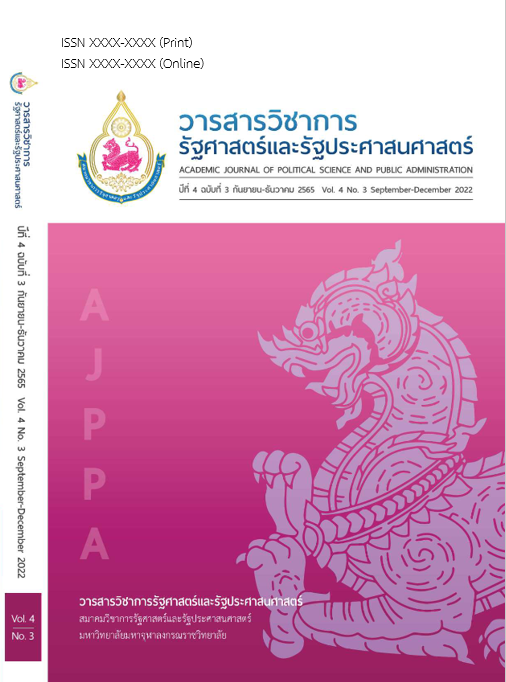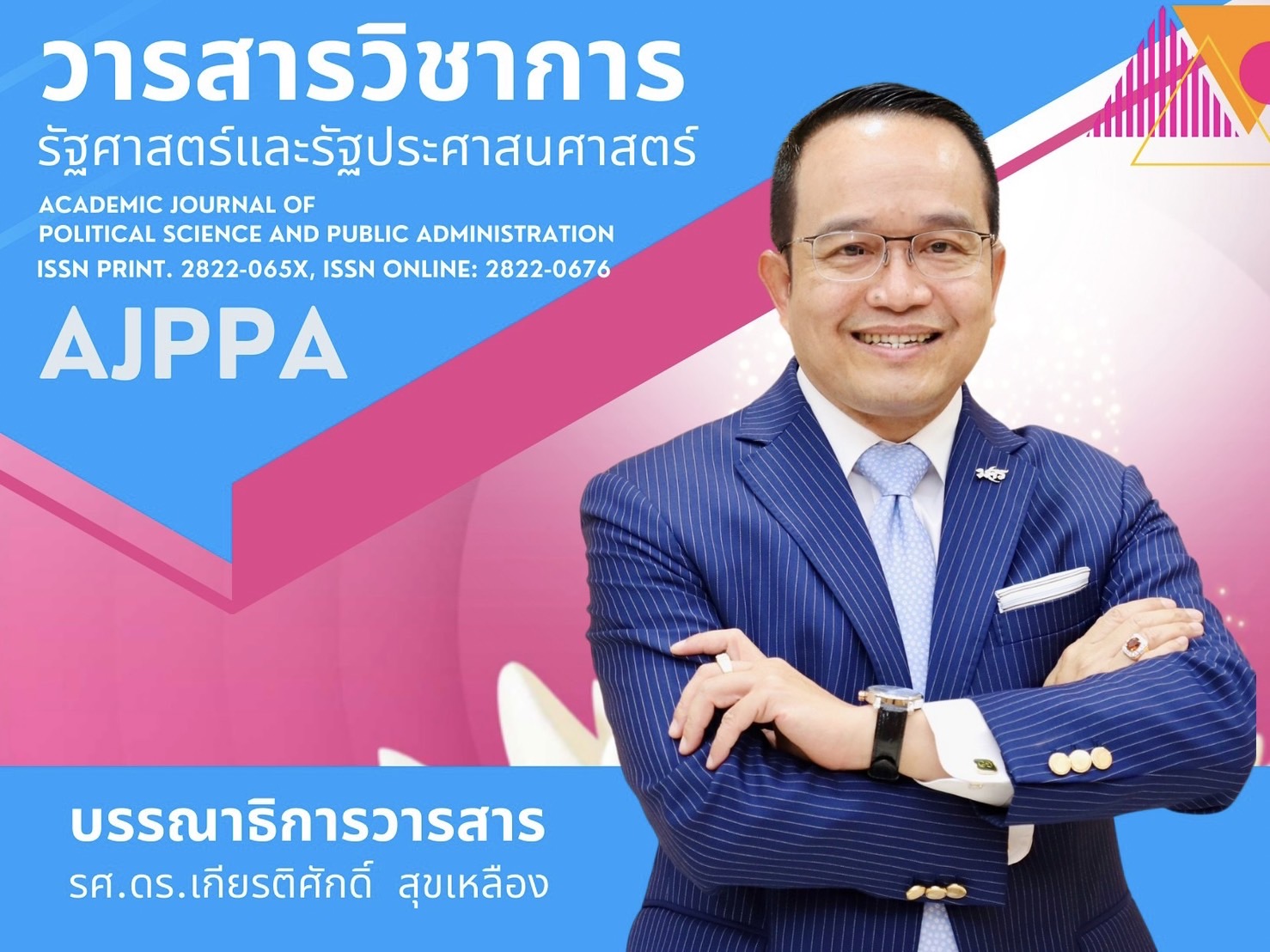วิเคราะห์สิทธิและเสรีภาพทางการเมืองตามแนวพุทธศาสตร์
คำสำคัญ:
สิทธิและเสรีภาพ, การเมือง, พุทธศาสตร์บทคัดย่อ
บทความวิจัยนี้มีวัตถุประสงค์เพื่อศึกษาวิเคราะห์สิทธิและเสรีภาพทางการเมืองตามแนวพุทธศาสตร์ ระเบียบวิธีวิจัยใช้การวิจัยเชิงคุณภาพ เก็บข้อมูลจากเอกสาร งานวิจัยที่เกี่ยวข้องและจากผู้ให้ข้อมูลสำคัญจำนวน 18 รูปหรือคนที่เลือกแบบเจาะจง จากผู้ทรงคุณวุฒิด้วยการสัมภาษณ์เชิงลึกแบบตัวต่อตัว และจากผู้มีส่วนร่วมในการสนทนากลุ่มเฉพาะ จำนวน 10 รูปหรือคนที่เลือกแบบเจาะจงจากผู้ทรงคุณวุฒิ โดยการสนทนากลุ่มเฉพาะ วิเคราะห์ข้อมูลจากทั้งสองวิธี โดยการพรรณนาความ และการสังเคราะห์เนื้อหาสาระ ผลการวิจัยพบว่า สิทธิและเสรีภาพทางการเมืองตามแนวพุทธศาสตร์ กล่าวคือแนวคิดสิทธิและเสรีภาพทางการเมืองตามแนวของพระพุทธเจ้า คือศีลธรรม เป็นปรากฏการณ์ของธรรมชาติตามธรรมดาที่แวดล้อมอยู่ทั่ว ๆ ไป ของสิ่งที่มีชีวิตด้วยและของสิ่งที่ไม่มีชีวิตด้วย ถ้าเป็นไปตามธรรมชาติแล้วย่อมปกติ เพราะเป็นกฎของธรรมชาติอยู่อย่างหนึ่ง ศีลธรรมเป็นสิ่งที่ทรงตัวอยู่โดยปกติที่เป็นตามธรรมชาติ ศีลธรรมเป็นบทบัญญัติทางศาสนา การบัญญัตินั้นบัญญัติในรูปวัฒนธรรม ศีลธรรม ระเบียบ จารีตประเพณี คือ ศีล สมาธิ ปัญญา วิมุตติ และวิมุตติญาณทัสสนะ แนวคิดสิทธิและเสรีภาพทางการเมืองตามแนวของพุทธธรรม เป็นสันติภาพ คือความมีสันติ ความสงบ เป็นเสรีภาพ คือ “วิมุติ” เป็นสมภาพ คือความเสมอภาค และเป็นภราดรภาพ หลักความเป็นพี่น้องกันโดยธรรม แนวคิดสิทธิและเสรีภาพทางการเมืองตามแนวของพระสงฆ์ เป็นคนมีคุณภาพชีวิตและการไม่เบียดเบียนตนเองและผู้อื่น เรียกว่าความเสมอภาคที่เป็นหลักการของประชาธิปไตย โดยใช้หลักสาราณียธรรม 6 เป็นหลักยึดให้เกิดเสรีภาพ ความเสมอภาคในสังคม มีพรหมวิหารธรรมยึดถือธรรมาธิปไตย โดยมีเศรษฐศาสตร์มัชฌิมาปฏิปทาสนับสนุน และปฏิบัติหน้าที่ให้สุจริตอย่างเต็มที่คือหลักกุศลกรรมบถ จักรวรรดิวัตร และราชสังคหวัตถุ สิทธิและเสรีภาพทางการเมืองในหลักธรรมระดับบุคคลต้องมีคุณสมบัติ 7 และเป็นสมาชิกแบบอย่างของสังคมตามหลักสัปปุริสธรรม 7 และหลักธรรมระดับสังคมต้องเป็นคนมีศีลธรรมตามหลักสุจริต 3 กุศลกรรมบถ 10 ศีล 5 เป็นคนมีคุณแก่ส่วนรวมตามหลักพรหมวิหารธรรม 4 สังคหวัตถุ 4 เป็นคนผู้มีส่วนร่วมที่ดีตามหลักนาถกรณธรรม 10 สาราณียธรรม 7 เป็นคนผู้มีส่วนร่วมในการปกครองที่ดีตามหลักอธิปไตย 3 อปริหานิยธรรม 7 และเป็นคนผู้นำรัฐหรือผู้ปกครองบ้านเมืองที่ดีตามหลักทศพิธราชธรรม 10 จักรวรรดิวัตร 12 ราชสังคหวัตถุ 4 สามัคคี 3 และอคติ 4
เอกสารอ้างอิง
ดิเรก ควรสมาคม. (2563). สิทธิมนุษยชน : ศึกษาเปรียบเทียบในทางพระพุทธศาสนา. วารสารนิติ รัฐกิจ และสังคมศาสตร์, 4(2), 133-134.
นครินทร์ แก้วโชติรุ่ง. (2556). รูปแบบและหลักการของการปกครองในพระไตรปิฎก (สารนิพนธ์พุทธศาสตรดุษฎีบัณฑิต สาขาวิชาพระพุทธศาสนา). พระนครศรีอยุธยา: มหาวิทยาลัยมหาจุฬาลงกรณราชวิทยาลัย.
นวลรัชดิ์ อมรรัตนบงกช. (2554). ศาสนากับการเมืองใหม่ในประเทศไทย (ดุษฎีนิพนธ์สาขาวิชาการเมือง). กรุงเทพฯ: มหาวิทยาลัยรามคำแหง.
พระเทพเวที (ประยุทธ์ ปยุตฺโต) และ ระวี ภาวิไล. (2532). พุทธบริษัท กับ พระธรรมวินัย. กรุงเทพฯ: สำนักพิมพ์ปัญญา.
พระเทพเวที (ประยุทธ์ ปยุตฺโต). (2532). พุทธศาสนากับสังคมไทย (พิมพ์ครั้งที่ 2). กรุงเทพฯ: สำนักพิมพ์มูลนิธิโกมลคีมทอง.
พระธรรมปิฎก (ป.อ. ปยุตฺโต). (2541). นิติศาสตร์แนวพุทธ (พิมพ์ครั้งที่ 3). กรุงเทพฯ: สำนักพิมพ์พุทธธรรม.
พระพรหมบัณฑิต (ประยูร ธมฺมจิตฺโต). (2557). ธรรมราชา. กรุงเทพฯ: มหาจุฬาลงกรณราชวิทยาลัย.
พระอ่อน มหิทฺธิโก (ระหุ่ง) และคณะ. (2563). การวิเคราะห์ปรัชญาสังคมในพระวินัยปิฎก. วารสารบัณฑิตศึกษามหาจุฬาขอนแก่น, 7(2), 119-120.
พุทธทาสภิกขุ. (2529). ธัมมิกสังคมนิยม. กรุงเทพฯ: มูลนิธิโกมลคีมทอง.
ภาณุทัต ยอดแก้ว. (2561). การวิเคราะห์คำสอนทางพระพุทธศาสนาเพื่อพัฒนาแนวคิดสิทธิมนุษยชน. วารสารไทยศึกษา, 14(2), 61-62.
มหาจุฬาลงกรณราชวิทยาลัย. (2539). พระไตรปิฎกฉบับภาษาไทย ฉบับมหาจุฬาลงกรณราชวิทยาลัย. กรุงเทพฯ: โรงพิมพ์มหาจุฬาลงกรณราชวิทยาลัย.
แสวง อุดมศรี. (2530). การปกครองคณะสงฆ์ไทย. กรุงเทพฯ: โรงพิมพ์มหาวิทยาลัยมหาจุฬาลงกรณราชวิทยาลัย.
อภิญญา ฉัตรช่อฟ้า. (2564). การสร้างและพัฒนาความเป็นพลเมืองภายใต้การปกครองระบอบประชาธิปไตย. วารสารสังคมศาสตร์และมานุษยวิทยาเชิงพุทธ, 6(3), 121-122.

ดาวน์โหลด
เผยแพร่แล้ว
รูปแบบการอ้างอิง
ฉบับ
ประเภทบทความ
สัญญาอนุญาต

อนุญาตภายใต้เงื่อนไข Creative Commons Attribution-NonCommercial-NoDerivatives 4.0 International License.




